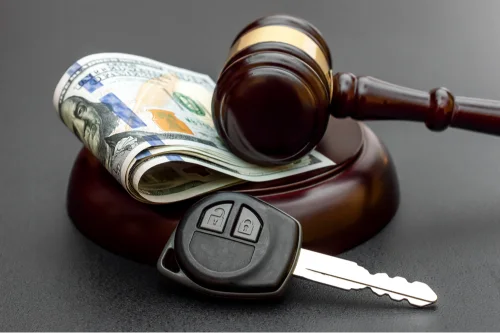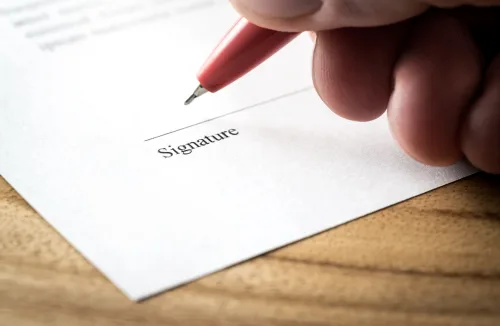 (281) 587-1111
(281) 587-1111
 (281) 587-1111
(281) 587-1111

Need to understand compensation for auto accidents? This guide by Baumgartner Law Firm in Houston, TX, covers all you need to know about compensation for an auto accident, from types of compensation to the steps for filing a claim and maximizing your settlement. Read on to learn how to get the compensation you deserve for auto accidents.
Key Points

Car accident compensation encompasses various types of damages that victims can claim after an accident. These damages can be broadly categorized into economic and non-economic damages. Economic damages cover tangible financial losses, while non-economic damages address more subjective intangible losses.
While there is a general range for a typical car accident settlement, the payout can differ greatly based on the severity of injuries and other factors.
Victims can seek compensation for various losses, including medical bills, lost wages, property damage, and pain and suffering. The eligibility to claim these damages typically hinges on proving that another party’s negligence caused the accident and resulting injuries. Understanding these types of compensation can help you navigate your car accident settlement process more effectively.
The next sections will explore economic and non-economic damages, detailing potential compensation and the factors that affect these amounts.
Economic damages are quantifiable financial losses that car accident victims face. These costs encompass medical expenses and lost wages. Additionally, they cover property damage. Economic damages, such as medical expenses and lost wages, are key to determining a typical car accident settlement. The costs associated with medical treatment for car accident injuries can be substantial, often forming a significant part of personal injury claims. For instance, the average medical expense after a car accident requiring hospitalization is around $57,000. Even short ER visits after a car wreck can run into the thousands.
Lost wages are another critical component of economic damages. This includes not only the immediate loss of income due to the inability to work but also potential future earnings if the injuries lead to long-term or permanent disability.
Property damage, such as vehicle repair or replacement costs, also falls under economic damages, often calculated based on the vehicle’s fair market value.
Non-economic damages refer to losses that don’t have a direct financial cost but significantly affect a victim’s quality of life. These include pain and suffering, emotional distress, and loss of enjoyment of life. Unlike economic damages, non-economic damages are more subjective and harder to quantify.
Calculating non-economic damages typically considers the severity of physical injuries and their long-term impact on the victim’s life. For instance, in Texas, there’s no cap on non-economic damages, allowing victims to claim full compensation for their pain and suffering. This ensures that victims receive a comprehensive settlement that addresses their financial and emotional needs.

Filing a car accident claim is crucial in seeking compensation for your injuries and losses. This process can be complex, requiring a thorough understanding of legal procedures and meticulous documentation. Legal assistance is often vital in navigating these complexities. Failure to report the accident to law enforcement or gather proper evidence can significantly weaken your claim.
This section outlines the key steps to file a car accident claim and strategies for dealing with insurance adjusters, providing a detailed roadmap to strengthen your claim and protect your rights.
The first step in filing a car accident claim is gathering evidence. This includes taking photos of the accident scene, collecting bills and receipts, obtaining treatment records, and noting witness contact information. These pieces of evidence are crucial in supporting your personal injury claim.
Once you have gathered the necessary evidence, you can file a claim against the at-fault party’s liability insurance. The insurance will cover personal injury claims and property damage resulting from the accident. Thorough and accurate documentation streamlines the claims process and increases the likelihood of a favorable outcome.
Dealing with insurance adjusters can be a daunting task. Insurance companies often aim to minimize their payouts using various tactics. They may deny claims or offer less than the requested amount to initiate negotiations. It’s advisable to avoid giving recorded statements to insurance adjusters without legal representation.
Claimants often face pressure to accept lowball offers or delayed responses from insurers in car accident cases. Having an experienced car accident lawyer on your side can help you navigate these negotiations and ensure you receive a fair car accident lawsuit settlement.
Remember, the insurance adjuster’s goal is to protect the insurance company’s interests, not yours.
Understanding the types of insurance coverage available for car accidents is essential for maximizing compensation. Different coverages can provide varying levels of financial protection depending on the circumstances of the accident. Texas’s minimum required personal automobile liability coverage is $30,000 per person. Additionally, a combined total coverage is $60,000 for a crash.
This section will explore the main types of insurance coverage, including liability insurance, Personal Injury Protection (PIP), and uninsured/underinsured motorist coverage. Knowing the specifics of each coverage type can help you file more effective claims and ensure you are adequately protected.
Liability insurance is mandatory in most states and covers bodily injury and property damage to others in an accident you cause. This insurance is critical because it helps cover the other driver’s medical expenses and property damage if you are at fault. State laws mandate minimum liability coverage limits, which vary from state to state.
Personal Injury Protection (PIP) insurance provides broader coverage than liability insurance. It covers medical expenses and income losses from injuries sustained in a crash. PIP is more comprehensive than Medical Payments (MedPay) insurance, covering income losses and certain deductibles.
PIP is not mandatory in all states; it is required in only a few and can be either optional or unavailable in others. Knowing whether PIP is available or required in your state can help you make informed decisions about your insurance coverage and ensure you are adequately protected.
Uninsured/underinsured motorist coverage (UM/UIM) is crucial for providing financial relief when the at-fault driver lacks sufficient insurance. UM coverage applies when the at-fault driver has no insurance, while UIM coverage applies when the other driver’s insurance is insufficient to cover all accident-related costs. This type of coverage is mandatory in some states, allowing drivers to recover damages when the at-fault party lacks sufficient insurance.
UM/UIM coverage is beneficial in hit-and-run accidents or when the at-fault driver is uninsured. Ensuring adequate UM/UIM coverage can protect you from significant financial losses in such scenarios.
The amount of compensation you can receive from a car accident settlement is influenced by several factors. These factors can vary widely and impact the final settlement amount. These factors include the severity of injuries, state laws, and the insurance policy limits of the at-fault party. While there is a general range for a typical car accident settlement, the final amount can vary significantly based on injury severity, state laws, and insurance policy limits. Understanding these factors can help you set realistic expectations and better navigate the settlement process.
We explore how these factors impact car accident settlements. The following subsections will explore how injury severity, state laws, and insurance policy limits determine the final settlement amount.
The severity of injuries sustained in a car accident significantly impacts the settlement amount. Higher payouts are generally awarded for serious injuries compared to minor ones. For instance, serious injuries like traumatic brain injuries often lead to higher settlement amounts than minor injuries.
Pain and suffering are also evaluated using a multiplier that reflects the injuries’ severity and impact on the victim’s life. Factors such as the extent of medical treatment and long-term effects on daily life are crucial in determining compensation for pain and suffering.
State laws play a significant role in determining car accident settlements. Unique laws govern insurance coverage and fault determination, directly impacting compensation amounts. The statute of limitations dictates how an individual can pursue legal action after an accident.
For example, in Texas, if you are partly at fault for the accident, your compensation may be reduced by your percentage of fault. Understanding state-specific laws can help you navigate your claim more effectively and ensure you are within legal timeframes.
Insurance policy limits directly influence the amount you can receive from an average car accident settlement. The at-fault party’s insurance policy limits the maximum recovery amount available for damages. For example, in a $50,000/$100,000 insurance coverage scenario, the maximum amount one person can receive is $50,000.
When the available insurance is insufficient to cover all damages, alternative recovery options may need to be explored. Knowing the insurance policy limits can help you set realistic expectations for your settlement amount.
Calculating your car accident settlement amount involves considering various factors such as medical expenses, lost wages, pain and suffering, and property damage. These factors collectively determine the overall compensation you can recover.
This section will discuss using medical bills and lost wages to calculate your settlement and estimate pain and suffering. Understanding these calculations can help you better prepare for negotiations with insurance companies.
Medical bills are a significant part of the economic damages claim, serving as primary evidence for compensation. Accurate documentation of all medical expenses, including future medical costs, is crucial in determining the settlement amount. Lost wages are calculated based on the income lost due to the injury sustained in the accident.
For instance, if you have $10,000 in medical expenses and $10,000 in lost wages, these amounts will form the basis of your claim. Ensuring all documentation is thorough and accurate will streamline the claims process and improve your chances of receiving fair compensation.
Pain and suffering compensation is often calculated using the per diem and multiplier approaches. The per diem approach assigns a daily value to the pain and suffering experienced, while the multiplier approach uses a factor based on the severity of injuries.
Factors influencing the compensation for pain and suffering include age, severity of injuries, and whether the injuries are temporary or permanent. These calculations ensure that victims receive compensation that reflects the true impact of their injuries on their lives.
Navigating the complexities of car accident claims can be overwhelming. Legal assistance from experienced car accident lawyers can significantly enhance your chances of receiving fair compensation. Car accident lawyers are responsible for managing your case and negotiating with insurance companies on your behalf, ensuring that your rights are protected and that you receive the compensation you deserve.
Having a personal injury lawyer can significantly impact the outcome of a car accident case. For instance, Baumgartner Law Firm has helped maximize compensation for car accident victims for over 35 years. Their expertise and experience can substantially impact the final settlement amount.
In the following subsections, we will discuss the benefits of legal representation and how to choose the right lawyer for your car accident claim.
A personal injury attorney can provide essential support in gathering evidence and negotiating favorable settlements on your behalf. Legal representation ensures your rights are protected and you receive the compensation you deserve. Having a personal injury lawyer can significantly impact the outcome of a car accident case.
Experienced personal injury lawyers, like those at Baumgartner Law Firm, have a proven track record of maximizing compensation for car accident victims. Their expertise in handling car accident claims ensures you are well-represented and your case is presented effectively.
Choosing the right personal injury lawyer is crucial to effectively navigating the complexities of car accident claims. A personal injury lawyer helps clients understand how laws affect claims and settlements. They provide the necessary guidance and support to handle your case professionally.
When selecting a car accident lawyer, consider their experience, specialization, and track record of success. Hiring an experienced personal injury lawyer can significantly enhance your chances of receiving fair compensation for your claims.
The duration for receiving a car accident settlement can vary widely, ranging from several months to a year after the claim is filed. The overall timeframe for settling a car accident case can span from immediate to several years, depending on factors such as medical treatment and evidence collection.
This section covers the timeline for receiving compensation, emphasizing settlement negotiations and court proceedings, helping you set realistic expectations and prepare for the process.
Negotiations with insurance companies can typically last between one to two months. Insurance companies often present quick settlement offers to minimize their payouts before victims know their full injury costs. Filing a lawsuit can lead to increased settlement offers from insurance companies, especially after the lawsuit is filed.
If a settlement cannot be reached, claimants may need to take their case to court, where a judge or jury will determine the compensation amount. Understanding the negotiation process and preparing for court proceedings can help you achieve a fair settlement.
Selecting a lawyer with courtroom experience is crucial, as it prepares you for potential trials if negotiations fail. If negotiations do not result in a satisfactory settlement, a skilled lawyer can help present your case effectively.
Legal representation is critical when facing court proceedings for a car accident case. A lawyer can ensure that your case is presented professionally and you receive the compensation you deserve.
Car accident victims often rush to accept settlement offers without fully understanding their injuries or related costs. Due to the statute of limitations, starting your claim as soon as possible is important. Having a lawyer review the settlement terms carefully can help you avoid common pitfalls.
This section highlights common mistakes to avoid, such as accepting initial offers and delaying medical treatment, to help you navigate your car accident claim more effectively.
Insurance companies aim to minimize payouts with low initial offers. Accepting an initial offer from an insurance company may result in receiving less compensation than you deserve. Consulting with a car accident lawyer is advisable. This is important before you accept any settlement offers from the other driver’s insurance company.
Only provide basic information when speaking with an insurance company, and do not agree to any offers without legal advice. This ensures that your rights are protected and you receive a fair settlement.
Following a car accident, seeking immediate medical treatment is crucial to ensure that injuries are properly diagnosed and treated. Delaying treatment may lead to worsened health conditions, complications, and possibly permanent damage to injuries. Long-term untreated injuries can cause chronic pain and impairments that affect quality of life and ability to work.
Documenting your medical treatment is essential for establishing the legitimacy of your injuries when filing a compensation claim. Ensuring timely medical care and thorough documentation can strengthen your case and improve your chances of receiving fair compensation.
You have two years from the accident date to file a lawsuit against the responsible party in Texas. It is crucial to adhere to this timeframe to ensure your legal rights are protected.
The severity of the injury primarily determines the worth of a personal injury case, the facts regarding liability, and the limits of available insurance. These factors play a crucial role in establishing the claim’s overall value.
In Texas, you can seek economic damages, such as medical bills and lost wages, and non-economic damages, including pain and suffering and emotional distress, in a personal injury claim. Understanding these categories can significantly impact your compensation.
To prove negligence in a personal injury case, it is essential to establish four key elements: duty, breach, causation, and damages. Meeting these requirements is crucial for a successful claim.
Personal injury lawyers usually charge on a contingency fee basis, which means they are only compensated if you successfully obtain financial compensation. This arrangement aligns their interests with yours in achieving a favorable outcome.
Baumgartner Law Firm
6711 Cypress Creek Pkwy
Houston, TX, 77069
(281) 587-1111
NEED HELP? HAVE QUESTIONS?